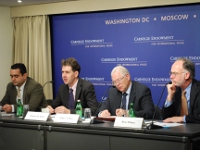Registration
You will receive an email confirming your registration.
IMGXYZ2697IMGZYXOn October 10th, 2009, the Turkish and Armenian foreign ministers signed two protocols in Zurich that were intended to develop and normalize relations between the two countries. Initially, there was great optimism about the historic agreement, but political bickering between the two countries resulted in a suspension of the Protocols just six months later. On the first anniversary of the signing of the Protocols, Carnegie hosted a panel discussion with Carnegie’s Thomas de Waal, Emil Sanamyan, editor of the Armenian Reporter, and the Atlantic Council’s Ross Wilson, a former U.S ambassador to Turkey. Carnegie’s Ambassador James F. Collins moderated the panel.
Analysis of the Protocols
The Protocols, negotiated by the Swiss foreign ministry, set out a framework for establishing diplomatic relations between the two countries and opening the Turkish-Armenian border, which has been closed since 1993. The documents deliberately did not include language on the 1915 killing of Ottoman Armenians and the Nagorny Karabakh conflict, two of the most disputed issues between the two nations, de Waal explained. The requirement that both parliaments ratify the documents was intended to create political cover for the politicians involved, but this also created an opportunity to delay implementing the Protocols.
- Ratification: The need for the parliament in Ankara to ratify the documents indicates that Turkey was already looking for a way to avoid normalization, Sanamyan argued. In his view, the Protocols were flawed because they focused on laying the diplomatic groundwork alone, instead of attempting to “re-establish mutual respect and trust on a societal level.”
- Mistaken Assumptions: In spite of their limitations, the Protocols have been “the most positive initiative in the South Caucasus for many years,” with the “potential to transform the region” if implemented, argued de Waal. He suggested that the eventual unraveling of the process resulted from a failure to market the documents properly to Azerbaijan in particular. A strong Azerbaijani campaign against the normalization of Turkish-Armenian relations—born out of fear that the Protocols would render Armenia less willing to compromise on the Karabakh issue—caused the Turkish government to backtrack on ratification. However, de Waal argued, Azerbaijan’s fears about the process were misplaced. If the border opens, Armenia will lose its siege mentality and become a more pliable partner in the Karabakh talks, he contended, while Turkey will finally realize its “zero-problems-with-neighbors” policy, become a more effective regional actor in the South Caucasus, and win more leverage over Karabakh.
Recommendations for the Future
- Karabakh: Turkey should define progress on Nagorny Karabakh more loosely, thus giving room for Azerbaijan and Armenia to explore more creative options for breaking the deadlock. For instance, restoring the railroad through Azerbaijan’s occupied territories to the Azerbaijani exclave of Nakhichevan would provide tangible benefits for all parties involved and could be a justification for Turkey to reopen the border, de Waal suggested. The panelists agreed that while the Karabakh talks must move forward, they should be viewed as a parallel process, rather than a pre-condition, to the Turkish-Armenian rapprochement.
- Temporary Hiatus: Resumption of negotiations is not likely to occur in the near future, given the preoccupation of both governments with domestic issues. De Waal predicted that the process will remain suspended until after the Turkish general election in mid-2011.
- Grassroots Initiatives: Turkish society has undergone a dramatic change during the past few years, becoming more open and tolerant on the difficult historical issues of Turkey’s minority communities. A number of scholarly and cultural initiatives, such as the reconstruction of the Akhtamar Church on the island of Van and unprecedented public commemoration on April 24th testify to this remarkable transformation. While its societal changes are not yet obvious to or recognized in Armenia, de Waal suggested that “the genie is already out of the bottle” and urged increased support for grassroots initiatives.
- Incremental Steps: At the start of negotiations in 2007, both Ankara and Yerevan were eager to change the paradigm that shaped bilateral relations, Wilson said. They wanted to deal with the most difficult issues dividing them and initiate negotiations in good faith toward that end. Instead of reinvigorating the Protocols, the two capitals should start with a simpler project, such as merely opening diplomatic relations between the two countries, as a way to encourage dialogue and break the current stalemate, he suggested.
- U.S. Role in the Region: The panelists agreed that the United States can play an important role in bridging the Turkish-Armenian divide. Unfortunately, however, the U.S. domestic politics have become a factor in the dispute. For instance, in April, 2010, international interest focused on whether U.S. officials would use the word “genocide” to describe the mass killings of Armenians in 1915. Sanamyan underscored that the clear power disparity between Turkey and Armenia means that Yerevan often needs a third party, such as Russia or the United States, to put pressure on Ankara.
- 2015: With the centenary of the Armenian catastrophe approaching in 2015, the United States should use this symbolic date to push for the full normalization of relations between the two countries and argue that it is in Turkey’s interest to be part of the centenary commemorations, said de Waal.
